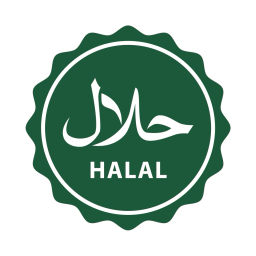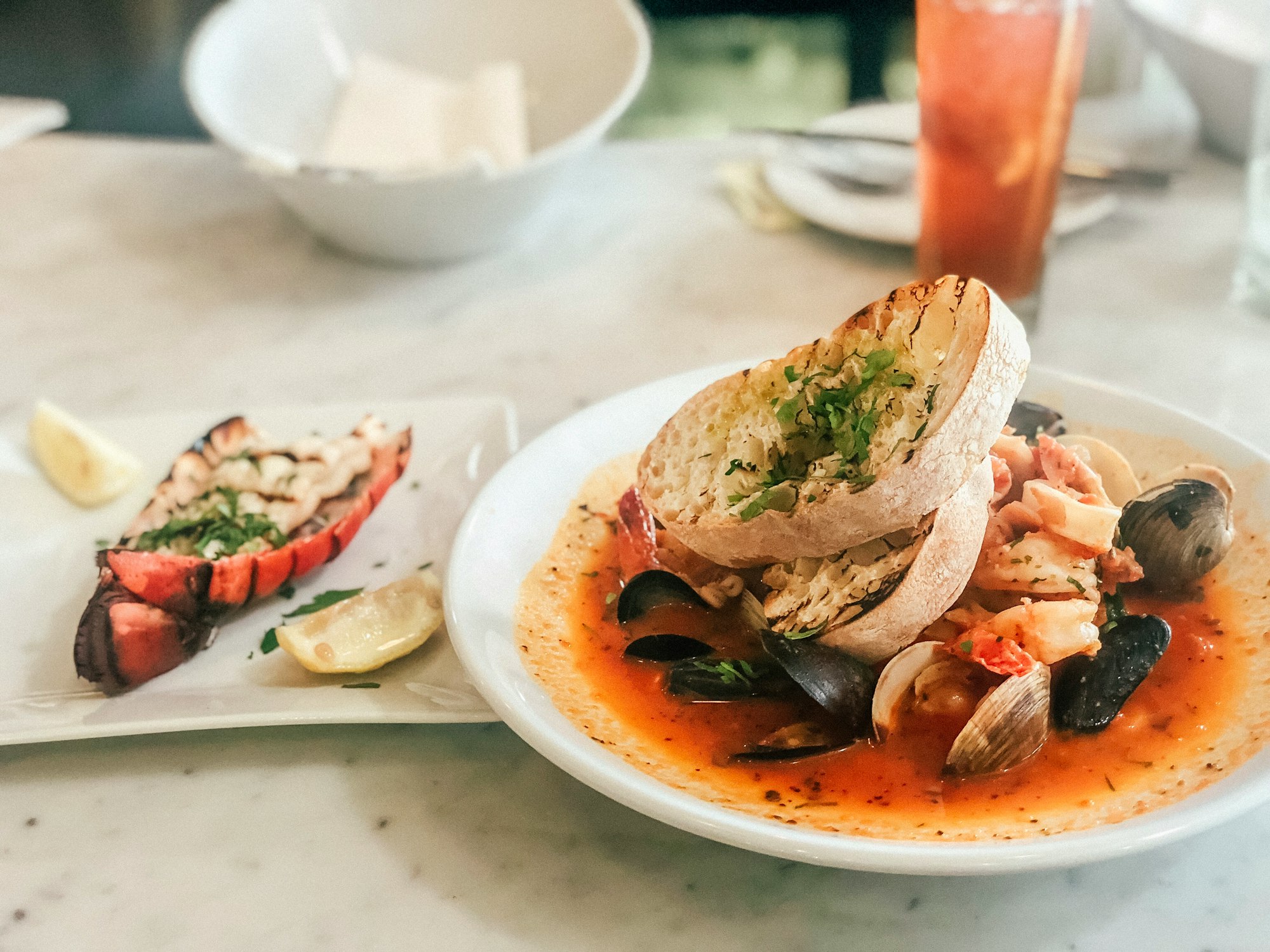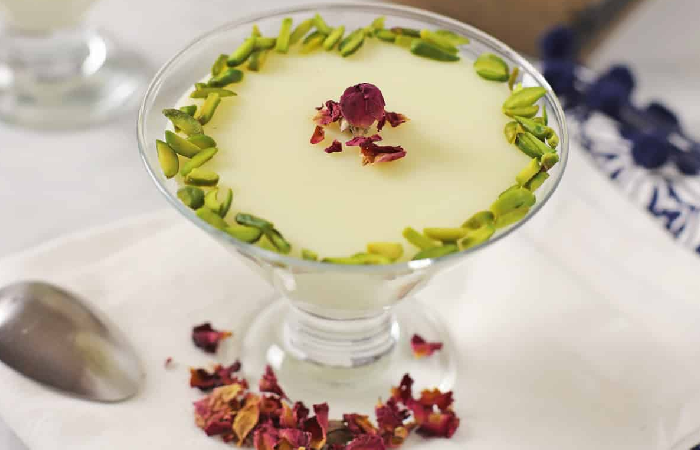Navigating the Waters of Halal Seafood: A Culinary Journey
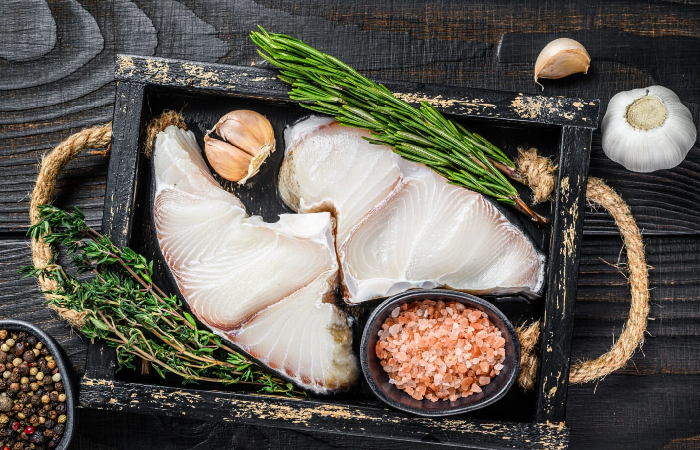
With the Muslim consumer market expanding, it's important to gain a deeper understanding of the terminology used to characterize the wide range of services, requirements, and customs associated with this consumer demographic. It will be easier for stakeholders to traverse this segment if they are familiar with these ideas, terminology, and definitions. The Arabic word "Halal," which has great meaning in Islamic culture, is among the most crucial to understand.
Arabic uses the word "Halal" to denote acceptability or permissibility quite frequently. Halal, in the context of Islam, describes deeds and conduct that are deemed acceptable in light of Islamic precepts. On the other hand, "Haram" refers to acts or conduct that are prohibited in the framework of Islam.
Concept Of Halal And Its Importance In The Culinary World
Any food that satisfies the requirements of Islamic law, as stated in the Quran, is considered halal.
According to Islamic dietary regulations, unless indicated otherwise, all foods and beverages are regarded as Halal. These regulations help Muslims all across the world determine whether items are Halal and satisfy their dietary needs in line with Islamic principles.
Muslims worldwide believe that the Quran is the last word from God and that it is the best source of wisdom for humankind.
The Quran states, "Eat of the good things which We have provided for you." Verse 2:172
"Oh you people! Avoid following the path of Satan and consume only what is good and lawful on Earth. In reality, he is your declared adversary. Qur'an 2:168
Foods and drinks should be free of pig, alcohol or other intoxicants, poisons, hazardous chemicals, and unsanitary aspects, even though certain specific teachings may differ. It is mandatory to slaughter meat using the Zabihah techniques, which are outlined in Islamic law.
Importance of Halal in the Culinary World
There are several reasons why halal cuisine is significant in the culinary industry. First of all, more than 1.9 billion Muslims globally depend on it in their diet. This indicates that there is a significant and expanding market for halal cuisine.
Secondly, the word "halal" is often associated with exceptional quality and ethical principles. Halal certification organizations ensure that halal food is made using techniques of slaughter that minimize animal suffering. Halal food manufacturing and processing must be carried out in a hygienic and sanitary manner.
Third, non-Muslims are also starting to favor halal cuisine more and more. This is caused by several things, such as the increased knowledge of halal dietary requirements, the thought to be high caliber of halal cuisine, and the expanding range of halal food options.
What makes seafood Halal?
Drawing from Qur'anic verse 5:96, which declares that:
"That which you take from the sea and use as food to provide for yourself and the travelers is lawful."
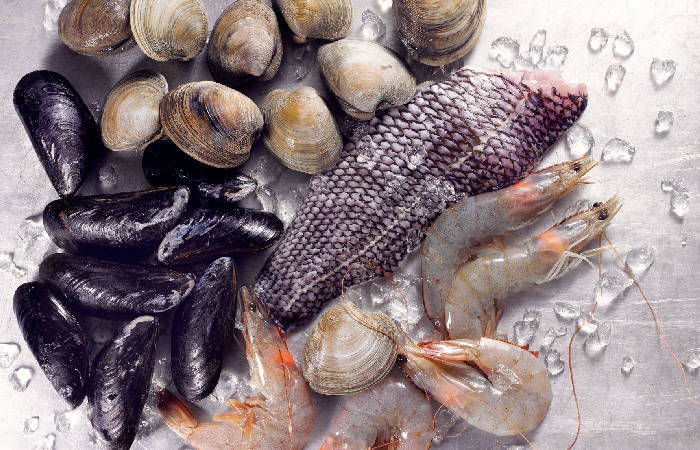
Seafood is classified as halal if it is produced or obtained in conformity with Islamic law.
This covers plants like seaweed as well, since it says generically that anything taken from the sea is permitted! Of course, anything dangerous is excluded, such toxic fish and plants that can trigger an allergic reaction, After all, prevention of harm is always more important than food approval.
Among Muslims worldwide, seafood is a popular choice. This delectable protein substitute stays away from non-Halal beef. The scriptural treatment of seafood's permissibility differs from that of terrestrial animals. The type of religious ritual slaughter that is required for other animals is not necessary for this one.
Exploring various Halal seafood options
As per Islamic dietary regulations, the subsequent seafood is classified as halal:
Fish that have fins and scales includes:
- Tuna
- Salmon
- Cod
- Haddock
- Mackerel
- Shrimp
- Prawns
Shellfish:
- Oysters
- Mussels
Crustaceans:
- Lobster
- Crab
Halal Burger And Bacon
Muslim consumers who wish to indulge in these traditional delicacies without going against their dietary limitations, frequently choose halal bacon and burgers.
Halal burgers are manufactured from cattle or lamb that has undergone a halal way of slaughter, while halal bacon is made from beef or turkey rather than swine.
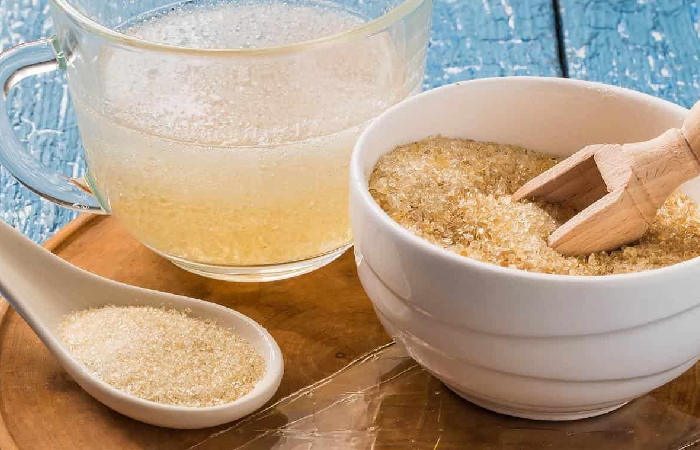
The Essence of Halal Seafood
Definition and significance of Halal seafood
What is meant by "halal seafood?"
Any seafood that is allowed by Islamic law for Muslims to eat is considered halal. The Prophet Muhammad's sayings and deeds recorded in the Hadith and the Quran include instructions on what types of seafood are permissible and prohibited.
The General Guidelines For Halal Seafood Are:
- Unless otherwise forbidden by the Quran or Hadith, all seafood is regarded as halal.
- Fish cannot be deemed halal unless they have fins and scales.
- Shrimp, prawns, and lobster are examples of shellfish that are halal.
- Marine animals like dolphins and whales are forbidden.
- Amphibians are prohibited as well, including frogs.
Since seafood is a delicious protein choice that stays away from non-Halal meat, Muslims all over the world love it.
Seafood does not need to be slaughtered in accordance with religious rituals like those required for other Halal animals like cows, goats, and chickens because its permissibility is handled differently than that of land animals.
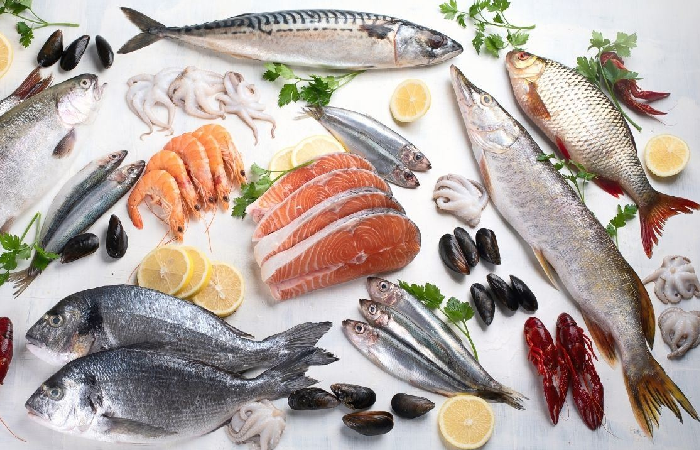
With the exception of animals that are toxic or dangerous to eat, the four major schools of Islamic philosophy agree that most seafood is halal and acceptable to ingest.
Some Muslims who are striving to follow a halal diet may find it difficult to eat shellfish. Some sects, for instance, abstain from eating shellfish.
Criteria That Classify Seafood As Halal.
Verse 5:96 of the Qur'an declares that "What you catch from the sea and use for food as provision for yourself and the travelers is lawful to you." This means that almost all kinds of seafood are Halal.
-
But in the era of global supply chains, every unknown step adds another level of uncertainty, just like any processed product.
-
A lot of seafood is partially processed, frozen, and sold far from its place of origin. This makes it more challenging to ascertain the true contents of a product and to draw any conclusions on the manufacturing process.
-
Could they even include wine, pork, or other banned ingredients? For instance, white wine is frequently used to prepare mussels and other fish, while bacon is a staple in many clam chowder recipes.
-
Other processed seafoods, like crab cakes or fish sticks, may have less evidently haram elements, such as unsuitable flavorings or additions.
-
Seafood farming, often known as aquaculture, presents challenges. By Halal rules, farmed animals would not have been allowed to be fed pork or any other unclean animal byproduct.
-
Processed animal protein mostly from pigs and poultry may be fed to fish under EU laws. The rising cost of wild-caught fishmeal is driving up demand for these types of alternative protein sources.
-
For Halal and other health-conscious consumers, this is a bigger problem than most think, as fish farms account for over 50% of the world's fish supply.
Halal Certification:
Halal certification is significant because of how seafood is treated in Islam.
-
The Hanafi school of thought views non-fish species as forbidden, despite the fact that all four major schools of Islamic thought regard fish as Halal.
-
Squid, octopus, mussels, and other related marine life would fall under this category. Though they and other animals like crabs and lobsters are controversial within their school of thought.
-
Many Hanafi scholars believed that prawns and shrimp were acceptable because they have a vertebra and are regarded as "fish."
-
Any doubts you may have regarding the acceptability of your seafood-based products can be dispelled with halal certification.
-
Muslim consumers trust reputable Halal certifiers, like Islamic Services of America, to provide theologically sound assessments on the acceptability of various items since they collaborate closely with Islamic experts.
-
Customers will save time and effort by not having to assess each product separately.
The health and spiritual benefits of consuming Halal seafood.
Muslims who eat halal seafood may experience a stronger sense of kinship with Allah and their community. Muslims share their beliefs and deepen their ties, when they consume halal meals together. You can also express your thankfulness to Allah for His gifts by eating halal cuisine.
Consuming halal seafood can enhance one's physical and mental health as follows:
-
The heart health, and brain function could improve and inflammation can be reduced by the omega-3 fatty acids included in halal seafood.
-
The protein in halal seafood is essential for the development and repair of muscle tissue. It also helps in the production of hormones and enzymes.
-
Seafood has been high in vitamin D which is good for the immune system and bones.
-
Healthy bodies can be shielded from the damaging effects of free radicals by the antioxidant selenium, which is present in halal seafood.
-
The thyroid needs iodine, which is present in halal seafood.
The spiritual advantages of eating seafood that is halal:
-
Eating halal seafood is a means to follow Allah's (God's) commands.
-
Consuming halal seafood improves a person's physically and spiritual well-being because it is seen as pure and wholesome.
-
Muslims can reconnect with their cultural heritage and traditions by consuming seafood that has been certified halal.
The Quest for Halal Lobster
Eating seafood, including lobster, is a popular practice worldwide. Many fish items, including crocodiles, squid, and crab, are forbidden to Muslims. We should think on what Islamic law says about this seafood before consuming them.
We should be aware of the current rulings, the opinions of Muslim experts, and Islamic jurisprudence before consuming this seafood.

Lobster is incredibly delicious and nutritious, making it one of the most popular seafoods consumed worldwide.
The majority of Muslims are conflicted over whether eating lobster is permissible in Islam or halal.
Lets discuss, Is Lobster Halal? in this article
The Debate Around Halal Lobster: Differing Opinions And Verdicts.
There are several creatures of Allah SWT in the water. Among them is lobster. It also belongs to the family that includes fish, lobsters, and crab shrimp that are commonly found in marine habitats.
Lobsters have a strong exoskeleton and are recognized by their unique appearance. Its long length and massive claws set it apart from other water animals.
However, we have a question when we enter a certain Muslim community. Is halal lobster? Can a Muslim eat it in Islam?
The majority of Islamic scholars who adhere to the Maliki, Shafai, and Hanbali systems believe that lobster is halal and permit consumption, yet this is a contentious issue.
According to those schools, eating lobster is halal. They claim that although it is prohibited, it is not stated in the Quran and hadith. They also considered these sacred Quranic texts as proof.
It is legal for you to pursue water game and utilize it as food for the benefit of you and other travelers.
[Quranic verse 5:96]
He is the one who subdued the sea so that you may take jewelry off of it and eat its succulent flesh.
16:14 of the Quran.
According to these experts, lobster would be regarded as halal in Islam. This is because it shares the same physical qualities as other seafood, including crab, shrimp, and squid.
However, those who adhere to Hanafi jurisprudence do not believe that lobster is permissible in Islam.
Hanafi school forbid eating lobster because it is deemed haram. They contend that halal animals are those that have scales and fins, other than that all seafood is forbidden.
It is important that we comprehend what Islam means by halal and haram. The notions of halal and haram are evident in Islam.
According to the Prophet Muhammad (peace be upon him), halal denotes what is allowed and lawful in Islam, whereas haram denotes what is forbidden and evil.
Based on the general permissibility of seafood, the majority of Islamic scholars and schools permit the consumption of lobster. Still, some people view it as haram because it isn't scaled.
When in doubt, Muslims are recommended to be cautious and stay away from lobster.
How to source Halal-certified lobster
To find lobster with a Halal certification, you can:
-
Consult the Islamic center or mosque in your community. They might have a list of suppliers of lobster that has received Halal certification.
-
Check the packaging for the Halal certification logo. This logo which consists of a crescent moon and star, signifies that the meal was cooked in compliance with Islamic law.
-
Purchase lobster from a reliable supplier of seafood. Find out if the lobster they sell is certified Halal.
-
Find out what the lobster eats. Pork and other non-Halal components must be excluded from the diet that lobsters are fed.
-
Find out how the lobster was killed. Islamic Sharia requires that lobsters be killed in accordance with islamic law.
-
Inquire about the packaging and processing used for the lobster. When processing and packaging lobster, all tools and equipment must be kept clean and free of non-Halal materials.
The following outlets provide lobster that has been certified Halal:
Muslim-Owned Food
Halal Guys
Zabihah
Islamic Food
Halal market
Preparing a Halal lobster feast.
Halal Lobster Rolls
The culinary landscape is relatively new to the concept of halal lobster rolls. They taste distinct since they are cooked using brioche bread rather than ordinary white bread. A sandwich consisting of brioche bread and lobster meat is called a halal brioche lobster roll. Though it is also present in Canada and the United Kingdom, the sandwich gained popularity in the United States.
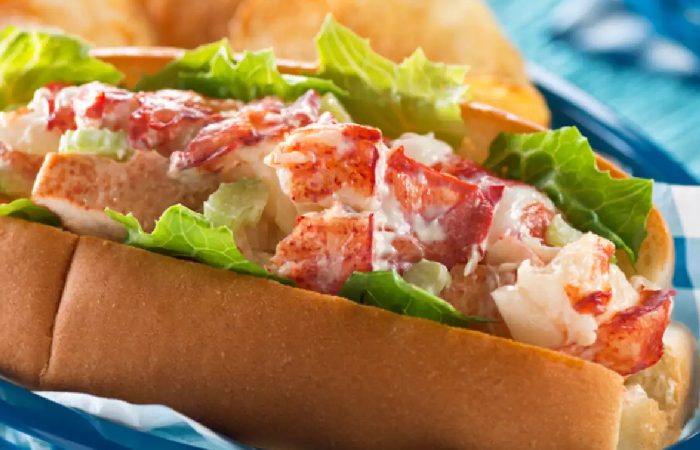
Ingredients:
-
Two-count brioche hot dog buns
-
200g of lobster meat
-
Celery 50g
-
50g onion
-
A small to medium pinch of black pepper
-
Parsley in moderation
-
Mayo Modest quantity
In the US, lobster rolls are not only a delectable dish but also highly liked. Though for many years offered only during formal dinner parties and on special occasions, lobster rolls have recently gained popularity as a lunch staple. It is possible to eat them as a main course even though they are typically served as an appetizer.
Preparation:
Place frozen lobster meat in a pot of boiling water, and cook for one to two minutes, or until cooked through.
Then simply chop and combine. Cooked lobster flesh, diced celery and onion, mixed with a little mayo, black pepper, and parsley.
Spoon the mixture of lobster flesh inside the hot dog bun and top with mayonnaise. If you enjoy butter toast, you can add lobster flesh filling to hot dog buns that have been fried in butter till golden brown.
Halal Shrimp: Ocean's Treasure
The bulk of Sunni Muslims follow the Hanafi school, which believes that just "fish"—not all forms of "sea game"—are allowed, including eel, croaker, and hagfish.
-
Any other sea (or water) creatures that are not fish are likewise makruh (detestable/abominable):
-
Regardless of whether they breathe oxygen from the water through their gills like crustaceans like prawns, lobsters, and crabs.
-
Mollusks like clams, octopus, mussels, and squid.
-
If they breathe oxygen from the air through their lungs like dolphins and whales, which are mammals.
-
Semi-aquatic creatures like penguins, which are birds.
-
Saltwater crocodiles, seals, and frogs, which are amphibians.
Understanding The Case Of Halal Shrimp.
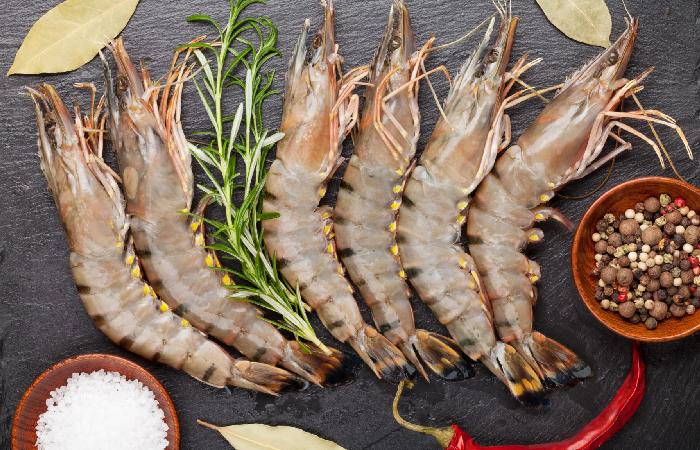
Is shrimp halal?
This question has been in debate among Muslims for a long time. Since eating seafood is not a topic covered in detail in the Quran, there is no definitive response to the question. It does, however, include recommendations that could be utilized to ascertain if shrimp is halal or haram.
Because shrimp lack scales, which is a requirement for a dish to be considered halal, there is reason to be skeptical about shrimp. Shrimp also don't have fins, which is another prerequisite for halal eating. Because of this, shrimp are frequently added to food items that are in question in accordance with traditional Islamic customs.
As long as the shrimp are captured alive, most people agree that they are halal. This implies that it has not died from natural causes prior to being eaten. The supporting evidence for this claim comes from our prophet's words, peace be upon him, where he states
“Its water is pure (for the purpose of purification rites) and its fish is lawful for you to eat.”(Sunan e Abi Dawood)
The versatility of shrimp in Halal cooking.
In halal cuisine, shrimp are a popular and adaptable component. It's low in fat, pairs rather well with most sauces and seasonings. It has a substantial protein content. Shrimp can be prepared in a variety of ways. Sautéing, grilling, frying, and baking. It also works great in a lot of other recipes, such as soups, stews, stir-fries, and curries.
The following dishes include shrimp:
Shrimp scampi: It is prepared with Shrimp, butter, garlic, and grape juice. These are the ingredients of this classic Italian dish. It's very easy to make and requires very little time. This makes it the perfect weeknight supper.
Shrimp curry: A famous and tasty meal from Southeast Asia is shrimp curry. Shrimp, coconut milk, and a blend of spices is used to make it. Naan, bread or rice goes well with shrimp curry.
Shrimp stir-fry: A tasty and nutritious dish that's ideal for a midweek dinner is shrimp stir-fry. Stir-fried vegetables, shrimp, and sauce are the ingredients. Noodles or rice often complement this stir-fried shrimp.
Shrimp biryani: It's a rice dish prepared with shrimp, veggies, and spices. In Pakistan and India, this dish is well-liked. You can serve shrimp biryani as a main course.
A Step-By-Step Guide To The Perfect Halal Shrimp Dish.
shrimp scampi
A very popular Italian recipe is shrimp scampi. Look for a halal wine substitute which is preferably grape juice. It enhances the dish's flavor profile with a hint of sweetness while harmonizing well with the sautéed garlic and fresh tomatoes.
Ingredients:
- 6 cloves garlic, chopped into large pieces
- 1 stick unsalted butter
- 1 tablespoon olive oil
- 2 large tomatoes, diced
- ½ small white onion, diced
- 2 pounds fresh shrimp, cleaned thoroughly
- ¼ cup white grape juice (not from concentrate)
- ½ teaspoon sea salt, or to taste
- ¼ teaspoon freshly ground black pepper, or to taste
- 1 (1-pound) package capellini or angel hair pasta, cooked and drizzled with olive oil to prevent sticking
- 2 tablespoons freshly grated Romano cheese, for sprinkling
- 2 tablespoons chopped fresh flat leaf parsley, for garnish
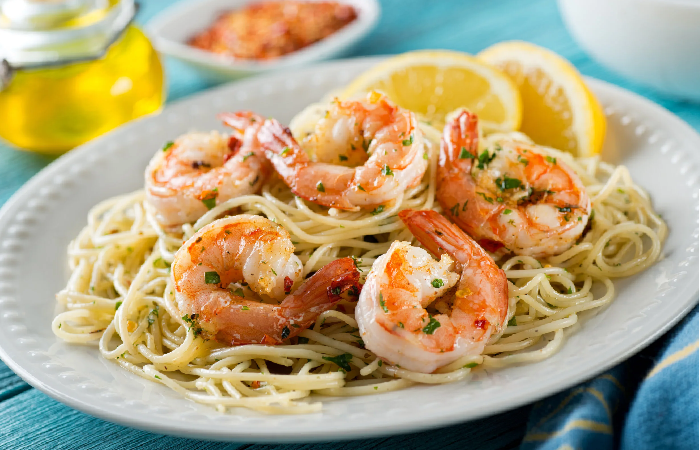
Instructions:
-
Once the butter in a small skillet has melted over very low heat, add garlic and cook until soft. Maybe five minutes will do for this. turn off the heat source and set it aside.
-
Oil is heated to medium-high heat in a large, deep pan. Add the tomatoes and sauté for two to three minutes, . Add the onion and cook until it is transparent. Simmer for two to three minutes.
-
After adding, cook the shrimp for three to five minutes on each side. till they start to get pink. Cook for a further three to five minutes after flipping.
-
By now, most of the liquid in the skillet ought to have cooled.
-
After adding the grape juice, turn the heat down to medium. Simmer for a minute or two.
-
Stir the garlic-butter mixture thoroughly after adding it to the skillet. Add pepper and salt for seasoning.
-
After the pasta is cooked, add it to the skillet and turn off the heat. Stir the sauce and shrimp into the noodles using two large forks or tongs. If required, add more salt and pepper after tasting.
-
Shift into a big serving basin. Add Romano cheese and sprinkle parsley. Serve hot.

Beyond the Sea: The Halal Burger Adventure
A burger that satisfies Islamic dietary regulations is known as a halal burger. It is made using halal meat. These rules mandate that animals must be killed in a specific manner.
This involves severing the carotid artery, jugular vein, and windpipe with a quick cut to the throat. Additionally, the animal must be alive when it is slaughtered. The Muslim who does the killing needs to utter the name of God before cutting.
The animal used to produce halal meat must be fed a natural diet and not receive antibiotics or growth hormones, in addition to the method of slaughter. Blood and a few other contaminants must also be absent from the meat.
The primary component of the burger is halal meat, although additional toppings such lettuce, tomato, onion, and cheese are optional. The bun can only contain halal ingredients—that is, no alcohol or animal products.
Halal burgers may also have extra components, such as spices or special sauces, to give them a distinct flavor. For instance, some halal burger restaurants season their burgers with Middle Eastern spices like za'atar or sumac.
The innovation of Halal seafood burgers.
South Asian chutneys and sauces, as well as Middle Eastern herbs and spices, await exploration in the world of flavorful Halal Burgers. These burgers' adaptability promotes culinary exploration and lets people try various flavors, textures, and cultural influences. Halal Burgers has something for everyone, whether you like your food spicy or sweet.
The need for halal food options is expanding, and eating trends are always shifting. Consequently, there has been a notable surge in creativity within the halal culinary industry, particularly with regard to seafood burgers.
The utilization of ethically and sustainably produced seafood is one of the main advances in halal seafood burgers. Chefs are choosing seafood with care, making sure that it comes from sustainable fisheries and that it complies with Islamic values regarding animal treatment and the environment.

Investigating the variety of seafood choices is another area of innovation. Chefs are experimenting with lesser-known fish like mahi-mahi, swordfish, and scallops in addition to conventional favorites like salmon and tuna. This diversity brings to light the wide range of seafood options accessible in halal cooking, while also expanding the culinary possibilities.
The emergence of halal seafood burgers is evidence of the culinary industry's flexibility and inventiveness. Through the adoption of halal principles and the integration of varied ingredients and cooking methods, chefs are ushering in a new era of tasty and sustainable halal cuisine.
How to ensure your seafood burger is Halal.
The following advice will help you make sure your seafood burger is halal:
Check The Source: Verify the seafood's origins to ensure that it comes from respectable, halal-certified fisheries. You can check the container for logos indicating halal certification or inquire with the restaurant staff about their sourcing procedures.
Check the techniques of preparation: Make sure the seafood is cooked in accordance with Islamic dietary regulations. This indicates that no non-halal substances should be used during the preparation process and that the seafood should be killed using halal techniques.
Ask the staff about cross-contamination: Find out whether there's a chance that non-halal components could contaminate food. If the seafood is prepared or kept in the same space as non-halal food, this may occur.
Select reputable eateries: Go for eateries that are well-known for providing halal seafood burgers. Seek out internet evaluations and suggestions from loved ones or acquaintances who have had dinner at the restaurant.
Pose questions: Ask the staff any queries you may have regarding their halal seafood burgers. They ought to be able to tell you where the seafood comes from, how it's prepared, and what safety measures are in place to avoid cross-contamination.
Crafting A delicious Halal Seafood Burger At Home.
Here is a recipe for a delicious and satisfying Halal seafood burger that you can prepare at home:
Ingredients:
For the seafood patties:
- 1 450 grams of ground halal seafood
- 1/2 cup of bread crumbs
- 1/4 cup of chopped onion
- 1/4 cup of chopped red bell pepper
- 2 tablespoons (30 ml) of olive oil
- 1 tablespoon (15 ml) of lemon juice
- 1 teaspoon (5 ml) of cumin powder
- 1/2 teaspoon of salt
- 1/4 teaspoon of black pepper
- 4 soft hamburger buns
- Lettuce leaves
- Tomato slices
- Sliced onion
- Halal mayonnaise
- Halal ketchup
Instructions:
-
Take a big bowl. Start by the mixing bread crumbs, red bell pepper and onion. Then add olive oil, lemon juice, cumin powder, salt, and pepper with the ground seafood. Mix well.
-
Separate the mixture of seafood into four equal parts and form them into patties.
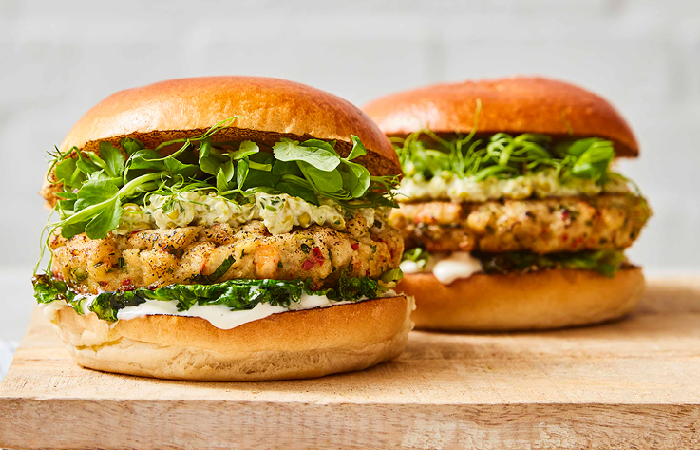
-
Preheat a large skillet. Cook the fish patties for 3–4 minutes on each side. You can also cook it until they are cooked thoroughly.
-
Toast the hamburger buns as the burgers cook.
-
Apply ketchup and mayonnaise to the bottom buns before assembling the burgers. Top with a cooked fish patty. Add a slice of tomato, onion, and a leaf of lettuce. After placing the top bun, tuck in!
Tips:
-
Add a small pinch of cayenne pepper to the seafood mixture to make the burgers hotter.
-
Other veggies like avocados and cucumbers can also be added.
-
You can also use crushed crackers or oats in place of the bread crumbs.
-
The burgers can be served with your preferred side dishes.
-
Try including fries, onion rings, or a salad.
-
Enjoy your delicious and satisfying Halal seafood burger!
The Discovery of Halal Bacon
The idea of halal bacon is a reflection of the continuous attempts to modify customs in the kitchen to suit a wide range of dietary requirements.
Through the investigation of substitute components and procurement techniques, halal bacon has surfaced as a feasible choice for those looking for a bacon-like taste that is consistent with their religious convictions.
It is expected that halal bacon will develop further and become more widely accepted in the culinary world as the demand for halal cuisine rises
A general dedication to meeting consumer wants, product variety, and consumer marketing are all contributing factors to the halal food industry's growth. Food wholesalers and brands are working harder to emphasize halal inclusion in order to draw customers from a wider range of consumer categories.
Because it is forbidden to consume pork bacon, several manufacturers have chosen to use turkey bacon instead, particularly in the Middle East and other regions where Islamic traditions ban eating any meat that isn't halal, including pork.
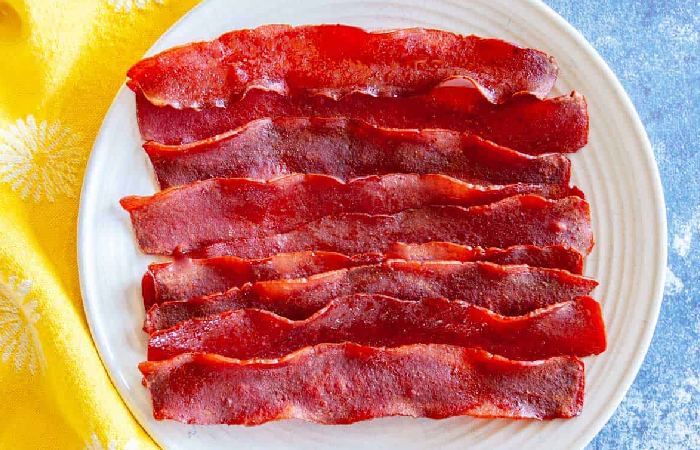
The turkey bacon is sliced and flattened to resemble ordinary bacon, giving consumers the familiar "breakfast bacon" appearance. Turkey bacon must follow Islamic slaughter guidelines in order to be considered "halal," even though its name does not make it intrinsically unhalal. It can be molded, chopped, or smoked to create what is often known as "bacon" after the killing process.
The Concept Of Halal Bacon And Its Sources.
The idea of halal bacon has gained a lot of attention in the world of culinary innovation. As the name implies, halal bacon is a product that resembles bacon yet follows Islamic dietary regulations. In contrast to regular bacon, which is made from pork, halal bacon is made from substitute ingredients that yet satisfy Islamic dietary laws and have the same savory, smokey flavor.
Anybody who follows the halal diet is aware that eating pork or anything derived from pigs is prohibited. In this case, bacon has less to do with the animal from which the meat came.
Rather it has more to do with the process of curing the meat or another type of food. Because of this, halal bacon is essentially just any halal food that has undergone curing in order to transform it into bacon.
This can also apply to any halal food item that has been shaped or colored to resemble a piece of bacon.
A chunk of meat is the basic ingredient in bacon. The meat has to have come from an animal that was killed and cooked in compliance with Islamic law in order for this to be considered halal bacon.
After this the meat is rubbed with salt on its surface. The salted meat is then allowed to cure for a while in a room or a refrigerator. As the salt draws moisture out of the meat, it will stay preserved.
Seafood and plant-based alternatives to traditional bacon.
In order to produce halal bacon, a variety of substances have been investigated as possible replacements for pig. Some of the most popular substitutes are:
Salmon Bacon: Many people believe that salmon belly is the tastiest part of the fish, salmon bacon is a bacon prepared from salmon. It is hot-smoked over hardwood, dried, and cured in natural spices. Salmon bacon may be made at home using a variety of recipes found online. It can be prepared by slicing smoked salmon into thin slices and baking them in the oven.
Plant-Based Alternatives: The manufacturing of halal bacon has also seen a rise in the use of plant-based ingredients such as seitan, tofu, and soy. These plant-based substitutes offer a vegan or vegetarian option that mimics the flavorful, smokey characteristics of bacon.
Seitan Bacon: Made from wheat gluten, seitan is a high-protein plant-based meat substitute that may be consumed vegan style.

To resemble classic bacon, it is seasoned with smoky tastes. With its chewy texture, seitan bacon is a versatile ingredient that can be used in a variety of recipes, including vegan BLTs and vegan full-English breakfasts.
Tempeh bacon: It is an alternative to bacon made from plants. It is made from fermented soybeans called tempeh. It is a good source of protein and has less fat. It is crispy, salty, and somewhat sweet. It has a smokey flavor. Cooking it on the stove top or in the oven makes it easy to make at home.
Mushroom Bacon: Made from sliced mushrooms, mushroom bacon is a vegetarian and vegan alternative to bacon. To give the mushrooms a smokey and delicious flavor, they are usually marinated or seasoned with products like soy sauce, liquid smoke, and spices. Mushroom bacon gives a rich umami flavour when cooked. It has a chewy texture. It's good on its own as a snack or as a topping for salads and sandwiches.
Incorporating Halal bacon into your meals.
You can follow Islamic dietary restrictions while adding a flavorful, smokey taste to your meals by using halal bacon. The following are some suggestions for using halal bacon for breakfast, lunch, and dinner:
Breakfast:
Egg Hash with Halal Bacon: Chop the halal bacon and fry it until it becomes crispy. Add the beaten eggs, chopped onions, and cubed potatoes. Add salt, pepper, and your preferred herbs for seasoning. Cook until the eggs are set and the potatoes are soft.
Halal bacon and avocado: Toast your preferred toast and top it with halal bacon and avocado. Add mashed avocado, halal bacon slices, sriracha sauce, and sesame seeds on top.
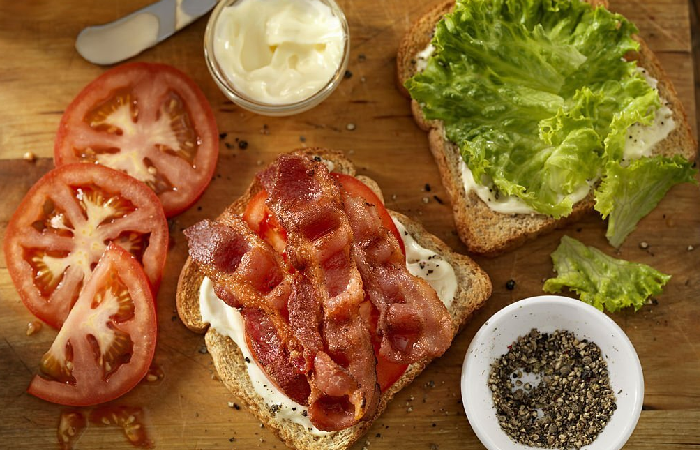
Lunch:
Halal bacon and grilled cheese sandwich: To make a halal bacon and grilled cheese sandwich, spread mayonnaise and mustard on two slices of bread. Top the layer with sliced cheese, halal bacon, and your favorite bread or bagel. Melt the cheese and cook it in a panini press or skillet until it turns golden brown.
Lettuce Wraps with Halal Bacon: Cook the halal bacon until crispy. Apply hummus on the leaves of lettuce. Add chopped veggies, tahini sauce, and halal bacon on top.
Dinner:
Bacon and Veggie Halal Stir-Fry: Turn up the heat to medium-high in a wok or big skillet. Cook the halal bacon until it becomes crispy. Include some of your favorite veggies, such bell peppers, broccoli, and carrots. Until the veggies are soft, stir-fry them. Add red pepper flakes, sesame oil, and soy sauce for seasoning.
Pasta Salad with Halal Bacon: Prepare pasta according package instructions. Cool and empty. Add chopped halal bacon, chopped veggies (cucumbers, tomatoes), and a creamy dressing (mayonnaise, sour cream, and your preferred herbs) to the cooked pasta.
Conclusion
Recap of the Halal seafood journey and its diverse possibilities.
Based on Qur'anic verse 5:96, which says, "Lawful to you is what you catch from the sea and use for food as provision for yourself and for the travelers," pretty much any kind of fish is Halal. Since this declares in general that anything taken from the sea is permissible, it covers a variety of plants, including
Fish with scales are allowed, while fish without scales are forbidden. Other than some edible aquatic crustaceans (shrimps, but not crabs), which are likewise permissible like scaled fish, Shia scholars often teach that no other aquatic creature is halal.
Most scholars regard shrimp to be halal for a few reasons. First of all, shrimp do not belong to the group of animals that are forbidden to consume because they are not predators. Second, shrimp satisfies the requirements for halal cuisine because it is devoid of blood and has very little fat.
Shellfish is what the Hanafi opens up on. They declared that seafood such as mussels, calamari, crabs, lobsters, and shrimp are forbidden. It is thought that their motivation is comparable to the Shafi'i's.
One more argument against the lobster's being considered haram is that it is a scavenger, meaning it eats trash and dead animals.
The future of Halal seafood and its place in global cuisine.
Halal fish is gaining popularity in the global food industry. It is anticipated that the halal seafood market would expand at a 6.3% compound annual growth rate (CAGR) and reach USD 22.1 billion by 2028. The market for halal seafood is developing as a result of an increase in Muslims and their disposable income.
Halal seafood has a promising future. The seafood sector is expected to keep expanding in the upcoming years. This is a result of growing public awareness of the advantages of halal seafood.
Furthermore, halal seafood is gaining popularity in global cuisine. Restaurants worldwide are seeing a rise in the popularity of Halal fish dishes as chefs use more and more inventive ways to prepare seafood.
Encouragement to explore and experiment with Halal seafood recipes.
Since the demand for healthier options is driven by issues like diseases and concerns about food security, the emergence of the ethical consumer has drawn even non-Muslim consumers to halal brands and goods.
Halal food has changed from being a religious diet option to a guarantee of secure, wholesome, hygienic, and consistent food due to the strict requirements involved in obtaining halal certification.
I urge you to look into and try out halal seafood recipes. Halal fish recipes are widely available in cookbooks and online, and they're delicious and simple to prepare.
Halal Seafood Recipes and Resources
Here Are Some Seafood Recipes You Can Enjoy
Moroccan Fish Tagine: A combination of Moroccan spices, fresh fish, tomatoes, onions, garlic, and ginger make up this filling and aromatic tagine. Traditionally, rice or couscous go with it.
Thai Coconut Curry with Shrimp: This fragrant and creamy curry is made with shrimp, coconut milk, red curry paste, galangal, lemongrass, Thai basil, and kaffir lime leaves. It's usually served with hot rice.
Mediterranean Baked Salmon with Lemon and Herbs: Lemon juice, olive oil, garlic, rosemary, and thyme are the flavors and herbs that come together to create the elegant and delectable Mediterranean Baked Salmon with Lemon and Herbs. Roasting the salmon results in flaky, perfectly cooked meat.
Japanese Pan-Seared Scallops with Soy, Mirin, and Sake: A sweet and savory sauce made with soy sauce, mirin, and sake is pan-seared along with these delicate scallops.
https://mycuratedtastes.com/japanese-spicy-soy-scallops/
A List Of Websites Providing Halal Food
https://www.halalfoodalliance.org/
https://www.zabihah.com/
https://www.foodguide.org.uk/
https://www.qlfoods.com/
https://alislamifoods.com/
https://www.daganghalalgroup.com/v2/
https://www.saffronroad.com/
https://www.janan-meat.co.uk/
https://www.cargill.com/
https://www.tahira.com/
A directory of retailers and restaurants that provide Halal seafood options.
It can be difficult to locate Halal eateries and grocery stores, but the search is worthwhile. Make sure to check out these eateries or supermarkets on our list if you're searching for a tasty and healthy Halal lunch!
- FLÉ FLÉ Grill in New York
- Zaitoon Halal Meat & Grocery in New York
- Hills of Herat in New Jersey
- Mughlai Grill in New York
- Royale with Cheese in Detroit, Michigan
- Taj Mahal in Cedar Rapids, Iowa
Further reading and resources for those interested in Halal food laws and lifestyle.
Resources
- The Halal Food Authority: https://halalfoodauthority.com/
- The Islamic Food and Nutrition Council of America (IFANCA): https://ifanca.org/
- The Halal Consumers Guide: https://www.halalguide.info/
Books
- Halal: An Islamic Guide to Food by Yusuf al-Qaradawi
- Principles and Practice of Halal Food Production by Muhammad Munir Chaudry
- The Halal Consumer Handbook by Mufti Muhammad Zubair Hassan
